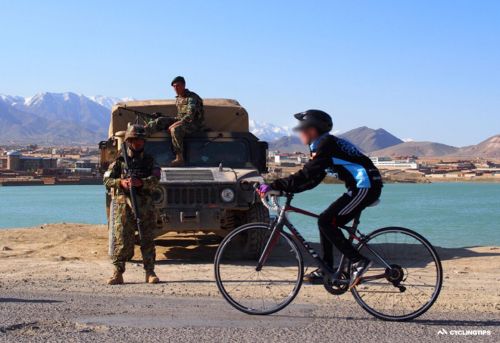COLORADO SPRINGS, Colo. (BRAIN) — Hundreds of female athletes, including cyclists, are in fear for their lives in Afghanistan as the Taliban takes control of the nation. Shannon Galpin, who has supported women's cycling in the country for over a decade, said she's receiving desperate pleas for help from within the country.
"There's a level of fear I've never heard," Galpin told BRAIN on Sunday. "This is the most helpless I've ever felt. I'm getting messages from young women just pleading for help and crying. It's men, too, begging for help getting their families out."
"There are several athletes in hiding. The Taliban is going door to door and women are burning everything — that's the most heart-breaking part: they are literally erasing themselves. They don't want to have any evidence, so they are burning their diplomas, their cycling gear, their photos, their family legacies," Galpin said.
Over the last decade Galpin has helped coach and raise funds for Afghan women cyclists, helping set up a team that received funding and equipment from the industry, including 60 donated bikes from Giant/Liv. Members of the team were later nominated for the Nobel Peace Prize.
Now it's time for the industry to step up again, she said.
The immediate challenge is getting about 350 women athletes out of the country, by charter flight or by driving to Pakistan.
The next challenge is to find nations and communities that will accept the refugees.
"What we need now is for the broader industry that has been verbally celebrating them, by sharing posts and following their story, to now more actively support them" — Shannon Galpin
The third challenge is to help the athletes engage with their new communities as they recover from the trauma.
The cycling industry can help on all counts, Galpin said, but probably most so on the last point.
"At its best, cycling builds community .... What we need now is for the broader industry that has been verbally celebrating them, by sharing posts and following their story, to now more actively support them, whether it's financially, or by calling their congressmen (to encourage the U.S. to accept more refugees from Afghanistan). Lawmakers and governors of about 13 states have said their states will accept refugees from Afghanistan.
Galpin also is reaching out to competition groups, such as the UCI and USACycling, for support. Soccer's governing body, FIFA and its pro players union, have been lobbying countries to accept athlete refugees. So far the UCI has been silent on the issue.
Galpin is looking for suppliers, retailers, and everyday cyclists to help. Many retailers supported fundraisers and equipment donation campaigns for the team in the last decade, and hosted Galpin on her book tour, and she's looking to them for help again.
Cycling community building
Galpin pointed to Masomah Ali Zada as an example of a Afghan refugee who has been accepted into the cycling community, in France.
"She and her family are part of their community, she races on a local team, she speaks French," Galpin said. Ali Zada competed in the Tokyo Olympics on the Refugee Team.
"Once they are settled, they are going to need bikes and they are going to need to go on group rides and learn the language and become more than just their labels as refugees. They need to recover their identities as cyclists and athletes and individuals. Too often we see refuges just put in a lump category as refugees, it's very dehumanizing."
"Cyclists can help with that support but we are a long way off from there. Now it is more the intangibles: making calls, donating money ..."
Galpin, who lives in Colorado, spoke with BRAIN from Scotland, where she is spending time this summer for personal reasons. Her immediate concern is helping athletes get to safe houses in Afghanistan and then finding ways to help them get out of the country.
A crowdfunding campaign dedicated to hiring charter flights to get people out of Kabul's airport has already exceeded its goal of $6 million.
Galpin has organized a separate campaign that is intended to help support refugee female athletes once they get settled.
"They are going to be stuck without PTSD support ... if and when they get resettled we are going to need mental health support, they are going to need to build communities around them."
That campaign has a goal of raising $100,000. As of Sunday afternoon, it has raised more than $21,000.


